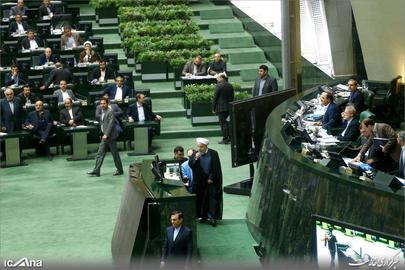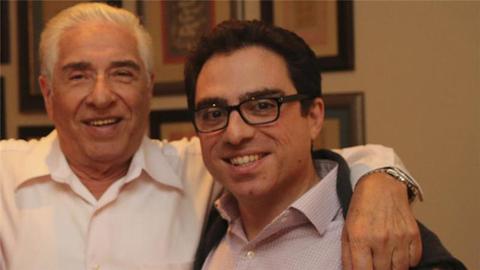On August 28, only two days after the impeachment of his finance minister, President Rouhani faced questions from the Iranian parliament about the failure of his government to control smuggling and reduce the unemployment rate, regarding the severe economic recession and the drastic fall in the value of Iranian currency, and continued banking sanctions.
Parliamentarians rejected the answers he gave to four of the five questions that were put to him. The matter was then referred to the judiciary for further review.
The questions were drawn up by 80 members of the parliament and were communicated to the president on August 1. According to Article 88 of the constitution of the Islamic Republic, “Whenever at least one-fourth of the total members of the Islamic Consultative Assembly pose a question to the President, or any one member of the Assembly poses a question to a minister on a subject relating to their duties, the President or the minister is obliged to attend the Assembly and answer the question.” And, according to Article 213 of the parliament’s own bylaws [Persian link], “If the majority of the representatives present at the session are not convinced by the president’s answer to a question and the subject of the question is the violation of the law or the rejection of the law, then the question is referred to the judiciary.”
Trying to Keep It Calm
During the parliamentary Q&A session, the most prominent interrogations came from conservative principlists opposed to Rouhani — Mohammad Dehghan, Hassan Naghavi Hosseini and Mojtaba Zonnour. “I hope to faithfully follow the guidelines suggested by the Supreme Leader about today’s session,” said Rouhani while answering the questions.
“Once again, Rouhani has paid a price for keeping calm and for [trying to] reduce domestic political tensions,” tweeted President Rouhani’s advisor Hessamoddin Ashna in his defence.
Judging from these two comments, during the Q&A session, Rouhani consciously tried to avoid making belligerent statements to keep political tensions low, probably following Ayatollah Khamenei’s advice.
But it was interesting to observe how other members of the parliament responded to President Rouhani’s responses too. The main moderate group in the Iranian parliament is the Omid (“Hope”) faction, which can usually muster somewhere between 90 to 100 votes in support of Rouhani. But on this occasion, only 74 representatives approved of the president’s answer when he was asked about reducing unemployment, and he received even less support for the way he answered the question about the fall in the value of Iranian currency, with just 68 members showing approval. So it is clear that even members of the Omid faction were unhappy with Rouhani’s answers.
With a vote of 150 to 138, representatives were also unconvinced by Rouhani’s answers regarding the smuggling of goods and currency and about the recession. The only answer that they seemed to find persuasive was the one about banking sanctions — this received 137 “yea” votes.
Psychological Warfare
There was a common theme to all of President Rouhani’s answers to the questions put to him in the parliament. Rouhani, at least publicly, does not believe that Iran is in a dire economic situation. He attributes the economic recession to a sense of hopelessness among the people as a result of the psychological warfare started by President Trump, who he says grabbed the opportunity offered by the nationwide protests that started in late December 2017 to withdraw from the nuclear agreement.
Media close to Rouhani have repeatedly claimed the protests were instigated by Rouhani’s opponents in the city of Mashhad. But members of the parliament blamed the government’s mismanagement and incompetence for the existing situation. In addition to conservatives and the normally-supportive Omid faction taking issue with his stance, people on social media did not respond well to his performance either — especially Rouhani’s claim that a large part of the blame lies with critics of his policies and people’s demands.
This was the first time ever that President Rouhani was summoned to the parliament to answer questions. Now the question will be how Iranian politics will be affected by this event.
At the moment, the principlists’ most urgent demand is to bring the judiciary into the fray. However, this potential scenario is not clearly spelled out from a legal point of view. Although Article 213 of the parliamentary bylaws specify that a question can be referred to the judiciary if “the subject of the question is the violation of the law or the rejection of the law,” it is unclear who holds the power to decide what constitutes a violation or the rejection of the law.
A Political, not Legal, Decision
According to Behrouz Nemati, the spokesman for the parliament’s board of governors, it is up to the lawyers of the parliament and its Judiciary Committee to carry out the legal research and judge whether the matter qualifies being sent to the judiciary or not. Then, however, it is up to the parliament’s board of governors to decide whether it should be referred to the judiciary. In other words, the decision comes down to politics and the relations between the president and the higher echelons of the parliament. This means Parliamentary Speaker Ali Larijani and his allies can use this as a new tool to secure Rouhani’s gratitude if it decides to refuse to send the questions to the judiciary. Equally, the principlists opposed to the president can use it to hurt his political standing. But no matter how one evaluates the situation, the outcome will be a politically weaker and a more vulnerable President Rouhani.
At the moment, of course, even if the questions are referred to the judiciary, the chances are low that Rouhani will be found guilty. Therefore, he will face a more powerful call for his impeachment. Hossein-Ali Haji-Deligani, member of the fiercest faction opposing Rouhani in the parliament, tweeted: “If today Mr. President does not provide convincing answers to the five questions about the economy, we will have no option but to sign the motion for his impeachment.”
It is most likely, however, that what happened in the Q&A session will not escalate any further. For the moment at least, President Rouhani’s opponents have succeeded in blaming his administration for the economic crisis. For now, they have enough fodder to launch further media attacks against him. For Rouhani to be impeached, there will need to be an agreement among high-level influential individuals — people over whom the members of the parliament have no control.
More on the Iranian economy and Rouhani’s troubles after the US withdrawal from the nuclear deal:
, August 27, 2018
Rouhani's U-Turn to Save Economy, August 10, 2018
Iran Appoints New Bank Governor as Freefall Continues, August 6, 2018
The Fall and Fall of the Iranian Rial, July 31, 2018
The Case of the Lost Euros in Aladdin Bazaar, July 3, 2018
Iran’s Currency in Turmoil — Again, June 25, 2018
When Will US Sanctions Hit Iranian Oil Sales?, May 18, 2018
The Future of Iran’s Economy as the US Bows Out of the Deal, May 10, 2018
visit the accountability section
In this section of Iran Wire, you can contact the officials and launch your campaign for various problems

























comments